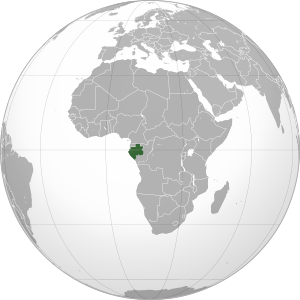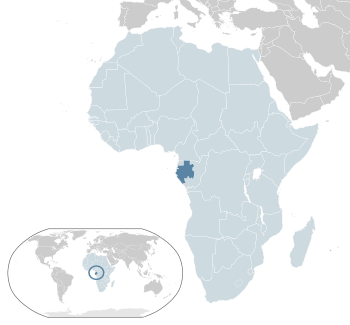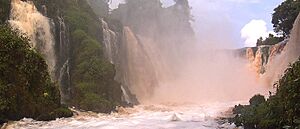Gabon facts for kids
Quick facts for kids
Gabonese Republic
République Gabonaise (French)
|
|
|---|---|
|
|
|
|
Motto: "Union, Travail, Justice" (French)
"Union, Work, Justice" |
|
|
Anthem: "La Concorde" (French)
"The Concord" |
|
| Capital and largest city
|
Libreville 0°23′N 9°27′E / 0.383°N 9.450°E |
| Official languages | French |
| Regional languages |
List
|
| Ethnic groups |
|
| Religion
(2021)
|
|
| Demonym(s) |
|
| Government | Unitary presidential republic under a military junta |
| Brice Oligui Nguema | |
|
• Transitional Vice President
|
Joseph Owondault Berre |
| Raymond Ndong Sima | |
| Legislature | Parliament of Gabon (suspended) |
| Independence from | |
|
• Republic established
|
28 November 1958 |
|
• Granted
|
17 August 1960 |
| 30 August 2023 | |
| Area | |
|
• Total
|
267,668 km2 (103,347 sq mi) (76th) |
|
• Water (%)
|
3.76% |
| Population | |
|
• 2023 estimate
|
2,397,368 (146th) |
|
• Density
|
7.9/km2 (20.5/sq mi) (216th) |
| GDP (PPP) | 2023 estimate |
|
• Total
|
|
|
• Per capita
|
|
| GDP (nominal) | 2023 estimate |
|
• Total
|
|
|
• Per capita
|
|
| Gini (2017) | 38 medium |
| HDI (2022) | medium · 123rd |
| Currency | Central African CFA franc (XAF) |
| Time zone | UTC+1 (WAT) |
| Date format | dd/mm/yyyy |
| Driving side | right |
| Calling code | +241 |
| ISO 3166 code | GA |
| Internet TLD | .ga |
Gabon (GƏ-bon), officially called the Gabonese Republic, is a country located on the Atlantic coast of Central Africa. It lies right on the equator. To its northwest is Equatorial Guinea, to the north is Cameroon, and to the east and south is the Republic of the Congo. The Gulf of Guinea is to its west.
Gabon covers an area of almost 270,000 square kilometers. About 2.4 million people live there. The country has different landscapes, including coastal plains, mountains like the Cristal Mountains, and a savanna in the east. The capital and largest city is Libreville.
The first people to live in Gabon were the Pygmy peoples. Later, around the 14th century, Bantu migrants also settled in the area. Gabon became independent from France in August 1960. Since then, it has had three presidents. In the 1990s, Gabon started a multi-party system and created a new constitution. This was meant to make elections fairer and improve the government. However, the Gabonese Democratic Party (PDG) is still the main political party.
The official language of Gabon is French. Most of the people belong to Bantu ethnic groups. Christianity is the most common religion. Gabon is rich in oil and gets a lot of money from foreign investments. This makes it one of the wealthiest countries in Africa. It has the fourth highest HDI in its region and the fifth highest GDP per person in all of Africa.
Contents
Gabon's Past: A Look at Its History
The very first people to live in what is now Gabon were the Pygmies. Later, Bantu people moved into the area. The weather conditions made it hard for a unique local culture to fully develop, unlike in some other parts of Africa.
European Arrival and the Slave Trade
In the 15th century, the first Europeans arrived in Gabon. From the 16th century onwards, the coast became a place for the slave trade. This was a sad period where many people were taken from their homes.
French Influence and Independence
In the 19th century, a French explorer named Pierre Savorgnan de Brazza explored the Gabon-Congo region. About 10 years later, France took control of the entire country. At that time, only a small number of Bantu people lived there.
In 1910, Gabon became part of a larger French colony called French Equatorial Africa. This group also included Congo, the Central African Republic, and Chad. French Equatorial Africa existed until 1959. Finally, on August 17, 1960, Gabon became an independent country.
Gabon's Presidents Since Independence
Since gaining independence in 1960, Gabon has had only three presidents.
- In 1961, Léon M'ba became the first president.
- After he passed away in 1967, Omar Bongo became president. He ruled Gabon for a very long time, until 2009.
- When Omar Bongo died in 2009, his son, Ali Bongo Ondimba, took over as president.
Exploring Gabon's Geography and Climate
Gabon is located on the Atlantic coast of central Africa. It sits right on the equator, which means it has a generally tropical climate. About 85% of the country is covered by thick rainforests.
Gabon's Diverse Landscapes
Gabon has three main types of land:
- Coastal Plains: These flat areas are between 20 and 300 kilometers wide along the ocean.
- Mountains: The Cristal Mountains are in the northeast, near Libreville. The Chaillu Massif is in the center, with its highest point, Mont Iboundji, reaching 1575 meters.
- Savanna: This grassland area is found in the east.
The coastal plains are part of an important ecoregion called the Atlantic Equatorial coastal forests. They also have areas of Central African mangroves, especially near the Muni River estuary, which borders Equatorial Guinea.
Rivers and Caves of Gabon
Gabon's longest river is the Ogooué, which flows for 1200 kilometers. The country also has three karst areas. These are places where there are hundreds of caves formed in dolomite and limestone rocks. Some well-known caves include Grotte du Lastoursville, Grotte du Lebamba, Grotte du Bongolo, and Grotte du Kessipougou. Many of these caves are still waiting to be explored!
Understanding Gabon's Government and Politics
Gabon has a presidential republic form of government. This means the president is the head of both the country and the government. The rules for this government are set out in the 1961 constitution, which has been updated several times.
The President's Role
The president is chosen by the people in an election and serves for a seven-year term. A change to the constitution in 2003 removed any limits on how many terms a president can serve. The president has many important powers, such as:
- Choosing and removing the prime minister and other government officials.
- Appointing judges to the independent Supreme Court.
- The power to close the National Assembly (part of the parliament).
- Declaring a state of emergency.
- Delaying new laws.
- Holding public votes (referendums) on important issues.
Gabon's Parliament
Gabon has a bicameral legislature, which means it has two parts:
- National Assembly: This part has 120 members who are elected by the people for a five-year term.
- Senate: This part has 102 members chosen by local councils and regional groups. They serve for six years. The Senate was created in the early 1990s. The President of the Senate is next in line to become president if something happens to the current president.
Changes to the Political System
In 1990, the government began making changes to Gabon's political system. They created a new constitution that included a bill of rights to protect people's freedoms. It also set up new groups to make sure these rights were protected and to advise on economic issues. An independent court system was also established.
Even though opposition parties were not yet officially legal, elections were held in 1990–1991. In January 1991, a law was passed that made it legal for opposition parties to exist.
Recent Political Events
In August 2023, after a presidential election, a group of military officials announced that they had taken control of the government. This happened just hours after Ali Bongo was officially re-elected for another term. General Brice Oligui Nguema was named the new temporary leader. This event was one of several military takeovers in the region since 2020.
Languages Spoken in Gabon
French is the only official language in Gabon. It's thought that about 80% of people in Gabon can speak French. In the capital city, Libreville, about 30% of people speak French as their first language.
Most Gabonese people also speak their own local languages, which are based on their ethnic group. A 2013 study found that 63.7% of Gabon's population could speak at least one Gabonese language. This was higher in rural areas (86.3%) than in cities (60.5%).
Religions in Gabon
People in Gabon practice different religions. These include Christianity (both Roman Catholicism and Protestantism), Islam, and traditional local beliefs. Some people combine elements of Christianity with their traditional beliefs.
- About 79% of the population are Christian (53% Catholic).
- 10% practice Islam (mostly Sunni).
- The rest follow other religions or no religion.
Gabon's Provinces and Departments
Gabon is divided into nine main areas called provinces. These provinces are then split into 37 smaller areas called departments.
The nine provinces are:
- Estuaire
- Haut-Ogooué
- Moyen-Ogooué
- Ngounié
- Nyanga
- Ogooué-Ivindo
- Ogooué-Lolo
- Ogooué-Maritime
- Woleu-Ntem
Gabon's Economy: Resources and Development
Gabon's land is rich in valuable resources like uranium, manganese, and especially oil. Money from oil makes up a large part of the government's budget (about 46%), the country's total economic output (43% of GDP), and most of its exports (81%).
Key Industries and Challenges
Gabon's economy relies heavily on extracting these natural resources. Before oil was discovered, logging (cutting down trees) was the most important industry. Now, logging and manganese mining are the next biggest sources of income after oil. Some studies suggest that Gabon might have the world's largest untouched iron ore deposit.
However, Gabon's economy is not very diverse. This means it relies too much on just a few things like oil. Some reasons why new industries haven't developed much include:
- The local market is small.
- The country depends a lot on imports from France.
- It's hard to sell products to nearby countries.
- There isn't always a strong spirit for starting new businesses among Gabonese people.
- The steady income from oil, even if it's decreasing, might make people less eager to try new things.
It's also difficult to invest more in farming or tourism because the country's roads and other facilities are not always well-developed. A few powerful local investors control many of the processing and service industries.
In the 1990s, with advice from the World Bank and IMF, the government started to sell off state-owned companies and make changes to how the government is run. This included reducing government jobs and slowing down salary increases. The government has said it wants to transform the country's economy.
Gabon's Rich Culture and Traditions
Gabon has a very diverse and interesting culture. Before colonial times, people in Gabon practiced religions that honored their ancestors' spirits, such as Bwiti, Mvett, and Djobi.
After colonialism, other religions like Christianity and Islam were introduced and added to the existing animist beliefs.
Sports and Recreation
The Gabon national football team has represented the country in football since 1962. Gabon was a co-host, along with Equatorial Guinea, for the 2012 Africa Cup of Nations. They were also the only host for the 2017 tournament.
Gabon is also known for its excellent recreational fishing. It is considered one of the best places in the world to catch the large Atlantic tarpon fish.
Images for kids
-
A map of West Africa in 1670
-
The Battle of Gabon resulted in the Free French Forces taking the colony of Gabon from Vichy French forces, 1940
-
President George W. Bush welcomes President Omar Bongo to the Oval Office, May 2004
See also
 In Spanish: Gabón para niños
In Spanish: Gabón para niños














